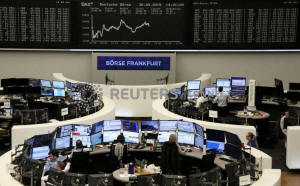Dollar powers to 29-month high, stocks stay standing despite weak data
 Send a link to a friend
Send a link to a friend
 [October 01, 2019]
By Marc Jones [October 01, 2019]
By Marc Jones
LONDON (Reuters) - The dollar bulldozed
almost everything in its path on its way to a 29-month high on Tuesday,
as a blizzard of soft global data left the U.S. economy as the only one
still looking in reasonable health.
European stocks and the euro both suffered shaky starts as euro zone
manufacturing data showed the sharpest contraction in almost seven
years, but it was by no means the only alarm bell ringing.
Australia's dollar <AUD=D4> had tumbled overnight after its central bank
cut interest rates in its trade war-hit economy for the third time this
year. That in turn dragged the neighboring Kiwi dollar <NZD=D4> to a
4-year low.
"On we go with the dollar," said Societe Generale strategist Kit Juckes.
"It is the pick of the major economies and I don't think anything is
going to change (for the dollar) until the economy slows."
"If you are very sensitive to global trade and sensitive to
manufacturing you are having a very tough time of it at the moment,
there is no doubt about it."
The dollar index against a basket of major currencies rose 0.2% to
99.585, its highest level since May 2017.

Bond markets were also grumbling after a weak auction of Japanese
government debt underscored the lack of enthusiasm for the negative
interest rates that more and more countries will be heading toward if
economies and inflation stay weak.
That worry fed across to higher bond yields across major markets, with
10-year German, French and Spanish and U.S Treasury yields all up 2 to 4
basis points.
Economic surprise indexes published by Citigroup for the United States
and Europe showed an increased divergence. The former is at its highest
in nearly two years; the latter has fallen to a 2019 low.
HOT CHIPS
It wasn't all gloomy though. In Asia, the world's largest contract
chipmaker TSMC <2330.TW> of Taiwan jumped 2.9% to hit an all-time high.
MSCI's broadest index of Asia-Pacific shares outside Japan had inched up
0.23% while Japan's Nikkei <.N225> rose 0.6% and Australia's benchmark
<.AXJO> by 0.8%, some of that coming after the central bank rate cut.
[to top of second column]
|

The German share price index DAX graph is pictured at the stock
exchange in Frankfurt, Germany, September 30, 2019.
REUTERS/Staff/File Photo

White House trade adviser Peter Navarro had also dismissed reports
on Monday that the Trump administration was considering delisting
Chinese companies from U.S. stock exchanges as "fake news"
"Whether it was a fake news or not, it is becoming harder to know
exactly what the U.S. administration will be doing," said Takashi
Hiroki, chief strategist at Monex Securities.
China and the United States are due to resume high-level trade talks
next week in Washington.
Back in the currency market, the euro traded at $1.0888 <EUR=>,
having slipped to a near 2 1/2-year low.
The yen was slightly weaker at 108.24 yen to the dollar <JPY=>, not
far from last month's low of 108.48 too.
Gold also fell to a two-month low as the stronger greenback took its
toll on metals markets, It was last trading at $1,468.50 per ounce.
Oil prices rebounded, however, after data showed production at the
world's largest oil producers fell in the third quarter. It also
came after a sizeable 8% drop over the last few months.
U.S. West Texas Intermediate (WTI) crude rose 1.2% on to $54.28 per
barrel after falling 3.3% on Monday. Brent was up 1% at just under
$60 a barrel.
"Any rallies, though, are likely to be met with plenty of sellers as
a slowing global economy and the recovery of Saudi production
outweigh any Middle East risk factors for now," Jeffrey Halley, a
senior market analyst for Asia Pacific at OANDA in Singapore, said.
(Additional reporting by Florence Tan in Singapore; Editing by Kim
Coghill)
[© 2019 Thomson Reuters. All rights
reserved.]
Copyright 2019 Reuters. All rights reserved. This material may not be published,
broadcast, rewritten or redistributed.
Thompson Reuters is solely responsible for this content.
 |